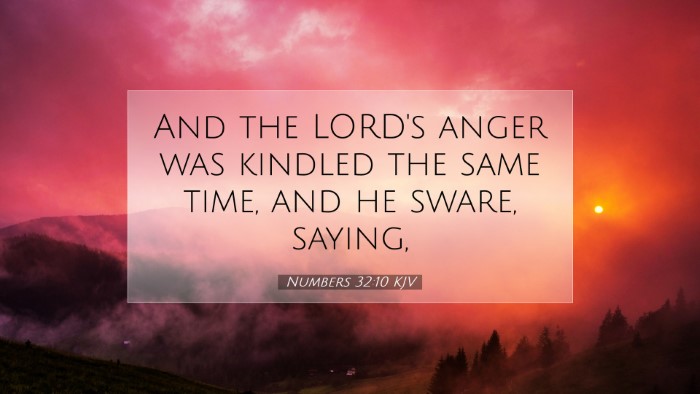Bible Commentary on Numbers 32:10
In Numbers 32:10, we encounter a pivotal moment in the wilderness journey of the Israelites as they approach the Promised Land. This verse states:
"And the Lord’s anger was kindled the same time, and he swore, saying," (Numbers 32:10, KJV)
Contextual Analysis
The context of this verse is crucial for understanding its implications. The Israelites have been wandering in the desert for 40 years, and the prospect of entering Canaan is close at hand. The tribes of Reuben and Gad, expressing their desire to settle on the east side of the Jordan, present a challenge to the unity and mission of the Israelite community. Their request reflects a moment where personal interest seems to conflict with communal obligation.
Commentary Insights
Matthew Henry's Commentary
Henry emphasizes that God's response to the Israelites—notably His anger—highlights His commitment to justice and the dangers of disobedience. He states:
"God’s anger is a sacred, just, and honorable thing; it arises from His perfect holiness, which cannot tolerate rebellion against His will." (Matthew Henry)
This quote speaks to the emotional gravity of divine wrath. Henry argues that if the tribes of Reuben and Gad turn from God's plans, they risk incurring His disfavor, an essential reminder of the weight of apostasy.
Albert Barnes' Notes on the Bible
Barnes provides a deeper theological reflection on the nature of God’s promises and His covenant relationship with His people. He explains:
"The anger of the Lord was kindled because the tribes wished to settle outside the land that God had promised them, ignoring the greater call of unity and mission." (Albert Barnes)
Barnes stresses the importance of communal identity and the dangers of individualism in the face of collective divine promise. The verse serves as a warning against pursuing selfish desires that can jeopardize the plans of God for His people.
Adam Clarke's Commentary
Clarke's insights build upon the historical context of the passage, highlighting the significance of obedience in the wilderness experience:
"This verse serves to remind the Israelites of the grave consequences of abandoning God’s directive; their past rebellion is echoed in the present desires of Reuben and Gad." (Adam Clarke)
Clarke suggests that the Lord’s anger here mirrors previous episodes of rebellion, underscoring the necessity for steadfastness in faith and unity among the Israelites. The overarching theme is that obedience to God's word ensures blessing, while deviation leads to judgment.
Theological Implications
Numbers 32:10 encapsulates essential theological themes crucial for modern believers:
- The Nature of God: God’s anger illustrates His holiness; He cannot abide sin or disobedience.
- Covenantal Community: The request of Reuben and Gad reflects the importance of collective faithfulness in a covenant context.
- Consequences of Disobedience: The verse serves as a severe warning against pursuing personal desires that contravene God’s plans and purposes.
Application for Contemporary Faith
For pastors, students, theologians, and Bible scholars, Numbers 32:10 presents an opportunity to reflect on contemporary applications:
- Unity in Diversity: How can churches ensure that individual congregant desires align with the overall mission of the body of Christ?
- Faithfulness in Challenges: In times of trial, how do congregations remain steadfast in their commitment to God's promises, and how do they address discord?
- Personal vs. Corporate Calling: What does it mean for modern Christians to prioritize collective worship and mission over individual ambitions?
Conclusion
Numbers 32:10 stands as a solemn reminder of God’s expectations of unity and faithfulness among His people. The insights gathered from public domain commentaries reveal the depth of meaning behind the text, challenging contemporary readers to reflect upon their own faith journeys, community involvement, and responses to God’s ultimate will. As we navigate our lives, may we remain anchored in obedience, ever mindful of the covenant relationship we share with our Lord.


